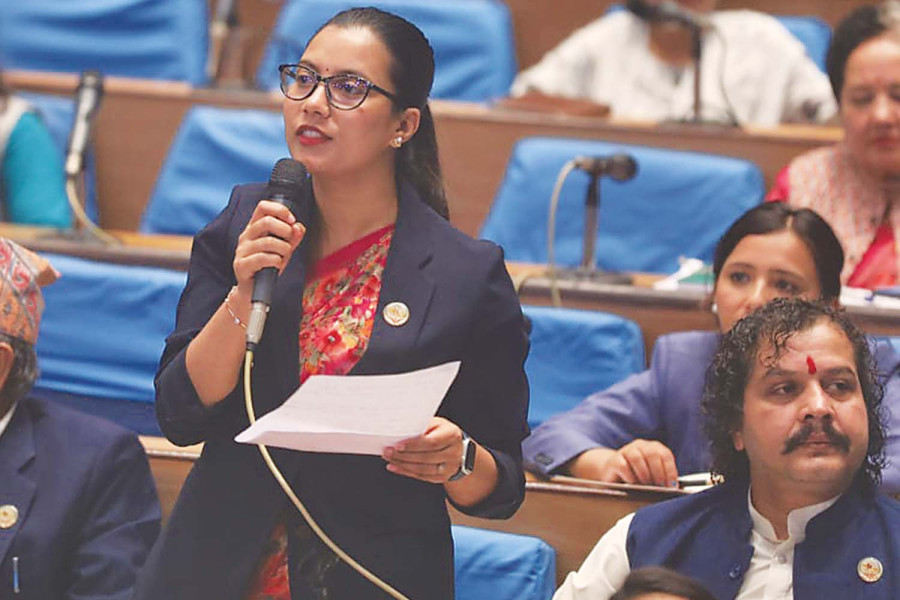Politics
Staff protest affects House proceedings
The Speaker has raised the issue with Prime Minister Dahal and Minister for Law, Justice and Parliamentary Affairs Giri, but to no avail. Seven ministers were scheduled to answer lawmakers’ concerns on Thursday. Only two could do so.
Post Report
Protests by employees at the Parliament Secretariat have affected deliberations on the national budget.
On Wednesday, eight ministers were scheduled to answer lawmakers’ concerns about the budget for the fiscal year 2024-25 at the House of Representatives. However, the meeting had to be adjourned even before one minister completed his reply due to the employees' non-cooperation.
The episode replayed on Thursday. Though seven ministers were scheduled to answer lawmakers' concerns, only four could respond. United under the Employee Union of the Federal Parliament Secretariat, the officials have been staging a series of protests. Starting Wednesday, they stopped working beyond office hours demanding allowances for overtime and odd hours.
The agitators say they will not work before and after office hours until they are paid allowances. Office hours start at 10 am and end at 5 pm.
“We will not be working extra hours without additional payment,” Govinda Belbase, chairperson of the union, told the Post. “Our non-cooperation continues.”
As the protest started to affect House proceedings, Speaker Devraj Ghimire, together with Narayan Dahal, chairperson of the National Assembly, held discussions with Barsha Man Pun, the finance minister, on Thursday to address the demands. However, Pun did not respond positively.
Shekhar Adhikari, Ghimire's press advisor, said the Speaker has taken the staff's non-cooperation seriously as it has hampered the House business. The Speaker has also raised the issue with Prime Minister Pushpa Kamal Dahal and Minister for Law, Justice and Parliamentary Affairs Padam Giri, but to no avail.
Even before the formulation of the national budget, the Parliament staff had drawn the attention of Ghimire, Dahal, and Padma Prasad Panday, the general secretary at the Parliament Secretariat. Ghimire had requested Pun to increase Parliament’s budget and resume the allowances for extra work his staff performed.
However, the money was not allocated in the national budget presented in Parliament on May 28, prompting the protest.
Ekram Giri, spokesperson for the secretariat, said the protest has hit the House calendar. "The deliberations in the budget are not moving as planned," Giri told the Post, adding that the discussions between the Speaker and the government have not yielded positive results.
Parliament has less than three weeks to complete the deliberations on the budget and get it endorsed from both houses, Giri said. All the budget-related bills need to be authenticated by the President before mid-July. The new fiscal year starts on July 16.
The budget-related bills are scheduled to be endorsed by the lower house on June 27, but that doesn't look possible following the protests.
On normal days, meetings of the House committees were held in the morning while parliamentary meetings were conducted after 11 am. As the parliament staff have stopped working in the morning, no committee meetings have been held in the morning for days now.
Parliament Secretariat staff claim that they have to work regularly before and after office hours without being paid a penny beyond their regular salary, while lawmakers get travel and meeting allowances, in addition to their salary, for attending the House and parliamentary committee meetings.
Belbase said it has been three years since the government stopped paying the allowance.
Belbase said that the House meetings, which generally start at 11 am, run beyond 5 pm regularly. The staff must arrive at least an hour before the meeting for preparations and stay an additional hour after the meeting.
Protestors say they had been working over 10 hours a day for months without additional payment.
It was an injustice to them and against the ILO Convention of 1930, to which Nepal is a party, they say.
Article 3 of the Convention states, “The hours of work of persons to whom this Convention applies shall not exceed forty-eight hours in the week and eight hours in the day, except as hereinafter otherwise provided.”
The allowance for government staff was withdrawn following the Covid-19 pandemic. The government resumed the allowance in some state agencies, including the Election Commission and the Commission for the Investigation of Abuse of Authority, but not in Parliament, said Belbase.
“We are not going to compromise this time,” Belbase said. “This is a fight for justice.”




 10.12°C Kathmandu
10.12°C Kathmandu














